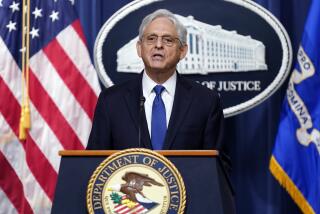Former GSA Chief Johnson Cleared in U.S. Ethics Inquiry
- Share via
Roger W. Johnson, who went to Washington to help reinvent government but instead was hounded out of public service by Capitol Hill’s cutthroat politics, was cleared Thursday of allegations that he used his powerful government position for personal gain.
John Russell, U.S. Department of Justice spokesman in Washington, said that Johnson, former head of the General Services Administration, was cleared in the latest probe. The investigation took more than three years to complete. Russell declined further comment.
The government’s decision not to prosecute Johnson was bittersweet news for the former Republican who angered Orange County’s GOP establishment by endorsing Bill Clinton in 1992. Johnson later joined the Democratic Party, but at one time he was the highest-ranking Republican appointed to the Clinton Administration.
Johnson, who resigned as GSA chief in March 1996, said he is still pained by the allegations of ethics violations that clouded his three-year tenure as head of the agency, almost from the day he arrived.
He blamed his problems on career bureaucrats and politicians who resisted his reforms for the GSA, an agency viewed by many in Washington as wasteful and inefficient, and a political “system that lets a small minority of people destroy one by innuendo.”
“This investigation is a good example of people chasing people merely to destroy them,” Johnson said. “It was that from the beginning, and it went on for 3 1/2 years, costing the taxpayers millions and me hundreds of thousands of dollars.”
The latest investigation focused on allegations that Johnson used his executive secretary to draft memorandums to his personal business consultants. He was also accused of using her to oversee furniture delivery and plumbing work at his Georgetown home. In addition, Johnson was accused of using his government driver and limousine for nonofficial duties.
The GSA Inspector General’s office had conducted an investigation of the allegations and forwarded its findings to the Justice Department for possible prosecution. A Justice Department official notified Johnson’s lawyer Thursday morning that the agency had declined to prosecute.
In 1994, a GSA audit found that Johnson owed the government $72 for improperly using his government credit card and mixing personal and official business trips. Johnson had requested the audit in answer to newspaper reports that he had improperly billed the government for travel, phone and mail expenses.
He voluntarily repaid a total of $1,062, but the investigation also revealed that he was entitled to be reimbursed for expenses he did not bill the government for. The scrutiny Johnson faced as head of GSA motivated him to pay for all trips to California--including those that were business related--out of his pocket and to charge most phone calls from his office on a personal credit card.
At the time, GSA officials blamed Johnson’s problems on “a lack of understanding about GSA regulations, as opposed to those in the private sector.”
On Thursday, the 62-year-old former chief executive of Irvine’s Western Digital Corp. said his Washington experience also included some gratifying moments. He went to Washington in 1993 as part of Clinton’s team to “reinvent government.”
“When I arrived at GSA, we had 20,000 employees and a $60-billion budget,” said Johnson. “When I left, we had 16,000 employees, and I had lowered the agency’s operating cost by 17%. None of the employees were laid off. Everything was done by attrition. I miss the days when we felt we were making a contribution to reforming government.”
“I still talk to the president periodically and am able to play a small role in government,” he added. “But I’m glad that I don’t have to take the day-to-day problems home.”
Still, Johnson left Washington with more than his share of bitter memories.
“The way the system works, it allows a very small minority to cause a great deal of trouble. They are immune from being held responsible for what they say or do,” said Johnson. “It’s a system that destroys people’s lives by innuendo. It’s a bipartisan disease.”
More to Read
Get the L.A. Times Politics newsletter
Deeply reported insights into legislation, politics and policy from Sacramento, Washington and beyond. In your inbox twice per week.
You may occasionally receive promotional content from the Los Angeles Times.









